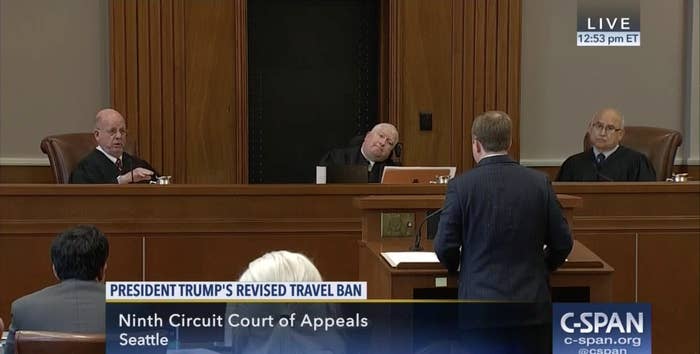
For the second time in two weeks, a top Justice Department lawyer faced a panel of federal appeals judges who were skeptical about the legality of President Trump’s latest attempt at a travel ban.
A three-judge panel of the US Court of Appeals for the Ninth Circuit heard arguments on Monday about a lower court judge’s order blocking Trump’s executive order that would temporarily halt immigration from six majority-Muslim countries. The arguments took place in Seattle one week after the Fourth Circuit in Richmond heard arguments in a similar case.
Acting Solicitor General Jeffrey Wall, who argued the case this past week in the Fourth Circuit, once again faced an array of questions about how much the judges should consider Trump’s statements during the presidential campaign in support of a ban on Muslim immigration, as well as statements by the president and his advisors about the purpose of the travel ban executive order after he took office.
“The executive order sets out national security justifications. But how is a court to know if in fact it’s a Muslim ban in the guise of national security justification?” Judge Ronald Gould asked Wall.
Wall pointed to a previous US Supreme Court case that said courts couldn’t look behind certain immigration-related decisions if, on their face, they presented a legitimate purpose and the government’s actions had a rational relationship to that purpose. The travel ban executive order doesn’t mention Islam, and the administration has repeatedly denied that it’s a Muslim ban.
“The benefit of that standard … is it doesn’t call on courts to make these sorts of determinations, the second-guessing of national security determinations that they’re sort of ill-equipped to do, Wall said.
During one of the more heated exchanges, Judge Richard Paez asked if President Franklin Roosevelt's executive order during World War II authorizing the internment of Japanese Americans would “pass muster” under the government’s arguments in the travel ban case. When Wall replied that it would not, Paez pressed him, noting that Roosevelt’s order was “facially legitimate.”
“I want to be very clear about this: This case is not Korematsu, and if it were, I wouldn’t be standing here and the United States would not be defending it,” Wall said.
Wall was referring to a now-widely disavowed decision by the Supreme Court in 1944, Korematsu v. United States, which upheld Roosevelt’s executive order. The lawyer who argued in the Ninth Circuit on Monday for the challengers, Neal Katyal, made a public statement in 2011 when he was the acting US solicitor general highlighting mistakes by that office in defending Roosevelt’s order in the Korematsu case.
Paez pushed back, asking Wall how the government would apply the “facially legitimate” standard it was arguing in the travel ban case to an order such as Roosevelt’s one, which didn’t explicitly reference Japanese Americans. Wall said he wasn’t familiar with the details of the order, but he couldn’t imagine a court saying it would survive under the standard the government was asking the court to apply.
Trump signed a new version of the travel ban executive order in March after federal courts across the country blocked enforcement of the first version, finding that it was likely unconstitutional. A federal judge in Hawaii blocked two provisions of Trump’s second executive order: the travel ban, and another provision that temporarily suspended the US refugee program. Arguments on Monday focused on the travel ban; there was little discussion of the refugee program suspension.
The judge in Hawaii, US District Judge Derrick Watson, found that the travel ban likely violated the constitution’s Establishment Clause by discriminating against Muslims.
The challengers had also argued that the ban violated a section of federal immigration law that prohibits discrimination in the immigration visa process on the basis of nationality. Wall, however, argued that another section of immigration law gave the president broad authority to halt the entry of foreign nationals into the United States, and that it wouldn’t make sense to allow people to get visas if they were going to be barred from actually entering the country.
Of that distinction, Judge Michael Daly Hawkins quipped that it would be “like Tom Hanks at the airport,” an apparent reference to the movie The Terminal, where Hanks plays a foreign traveler stuck at an airport because of diplomatic complications.
Gould asked Katyal if the court could uphold Watson’s injunction based on the immigration law claims if the appeals court didn’t agree with the constitutional claim. Katyal said they could.
Paez asked several questions that signaled possible concern about relying too much on Trump’s campaign statements, which the challengers cited in arguing their constitutional claim. At one point, Paez asked Katyal if the challengers could still win the case if the court didn’t consider the campaign statements. Katyal said Trump had said and done enough after becoming president to back up their claim that the order amounted to religious discrimination.
Paez, echoing questions from the Fourth Circuit last week, had also asked if Trump’s comments meant he could never adopt an executive order along the lines of the one he signed. Katyal responded that if Trump took steps to distance himself from the Muslim ban comments, such as explicitly disavowing them or making a clearer connection to national security threats, he could.
“Our constitution and laws are better than this,” Katyal said. “Our founders wanted America to be a beacon on our coast, and that beacon at the end of the day is not the quality of our sports teams, or the quality of our soil, that beacon ultimately is the majestic Article III and the grand contours of the First Amendment.”
Wall picked up on Katyal’s arguments in his conclusion, saying that Katyal was right that the US was a “beacon,” but that “what makes it a beacon is the rule of law.”

